What separates turn based games from other MMOs are the turns: instead of controlling an onscreen avatar as it's moving, you assess your current position and enter a series of commands for your units. When you turn is executed, there is a new position on the board.
Why that essentially changes a game from feeling like a "video game" to feeling like a "board game" is unclear to me. There are board games without turns, even a few rare strategy board games. I guess the idea is: strategy board game = think and make your best move from a static position; strategy video game = think fast and make a continuous series of moves from an ever changing dynamic position.
In traditional online strategy board games, even multiplayer ones, the system sends a message to the player whose turn it is (on screen or via email) and then waits, possibly an infinitely long time, for the player to make his or her move.
This won't work in MMOs, of course. So most MMO board games are played with set time limits for each move. These are called ticks, like clock ticks. All moves are then simultaneous. While a real-time game is continuously moving around you, turn-based games change state once every few hours or days, based on the moves relayed by each player. If you didn't send your move, you're out of luck.
In some MMO turn based games you are allotted time units at a certain rate. Different actions require different amounts of time units to perform. Time unit games feel less like board games and more like video games.
In traditional board games, there is generally a beginning and an end. Someone typically wins after some number of moves or after achieving some victory condition. In most MMOs the game is an unending series of acquiring resources or positions. This also makes them feel more like RPGs than like board games.
Integral to the sense of a board game is the ability to lose and start another fresh. Classic strategic or tactical moves are felt when they give you a feeling of definite accomplishment toward a set goal. The need to constantly be playing or lose all your work diminishes the idea of a "game-winning play".
Games with alternating turns are harder to adapt to MMO play than games already built for simultaneous play. MMO chess would be a light war game; many of the pieces would have to change functionality. But MMO Robo Rally or Boggle work great.
As usual, the definition of game can get in the way when discussing whether or not it's MMO.
Duplicate bridge events are played with thousands of people, each playing 24 or 28 hands. Is this a lot of people each playing a series of four-player games, or a massive amount of people all playing a single game with several rounds? Is the game multiplayer if it simply has a lobby where people chat and then slip off into game tables?
What if players gain or lose something after each encounter gaining resources in the bigger Game? Consider Magic Online. Each game is played one on one, but you accumulate cards and power in the overall Game.
The typical MMO board game is a war game. War games are easy to conceive, involve lots of different parties, pieces, and terrain, and the basics of tactics and strategy are built right in. The implementer has to decide what will be available, how fast to make the turns, and how to resolve conflicts.
The graphics of the game also add or subtract from the feeling of playing a board game. If the hexes or squares are visible, and the game looks two-dimensional, it feels more like a board game. If movement is more finely controlled, and the movement or graphics are three dimensional, it feels less like a board game.
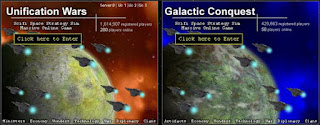
GamesTotal runs two time unit games, Unification Wars and Galactic Conquest, both sci-fi games of galactic conflict.
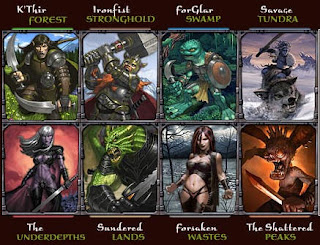
PoxNora runs a game that looks a little like a CCG, but involves building fantasy armies.
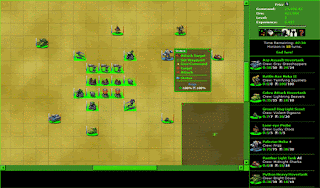
TinyWarz is a turn-based sci-fi combat game on a grid.
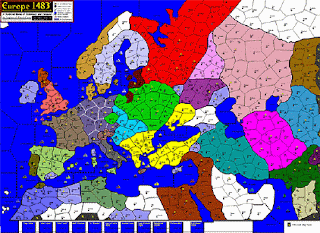
1483 Online is a semi-massive online game based on a Risk-like board game. It plays up to 90 odd players at a time, and has a beginning and end.
And so on. There are numerous other less popular turn based strategy combat games.
Non-combat oriented games are harder to find.
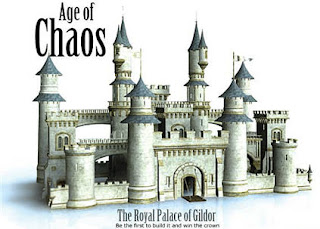
Age of Chaos is a turn based castle building game. This game is played in "ages"; the game ends at the end of an age with a defined winner.
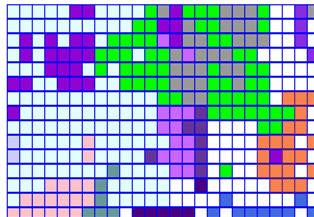
MMOSBG (Massively Multiplayer Online Strategic Board Game) is essentially a combat game, as well, but it's completely abstract so kind of has the feel of a traditional game. It uses time units.
Yehuda
1 comment:
I'm actually developing a game like this for my masters thesis. It's based on one of the earliest forms of computer games, the printout-based Play By Mail game such as those published by Flying Buffalo. My model incorporates twice-daily turn updating: users can submit moves whenever they want, and the world state updates at noon and midnight each day.
I'd be interested to know what you, and the reader community here, thinks about these games and their strengths and weaknesses.
Post a Comment